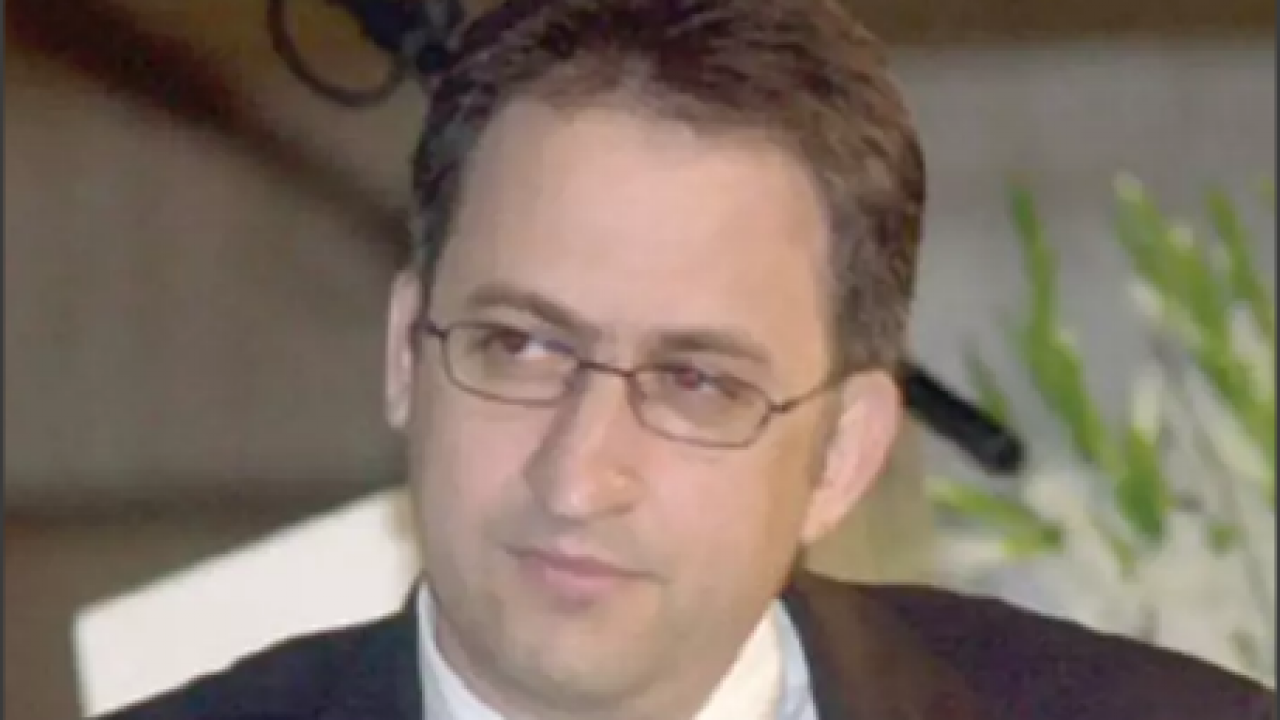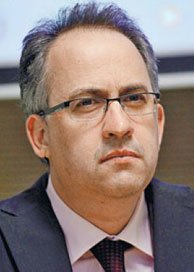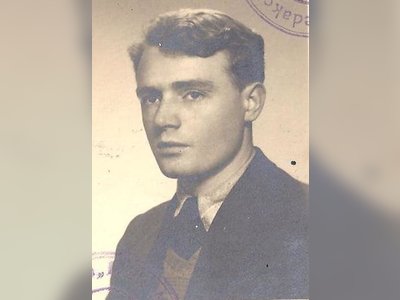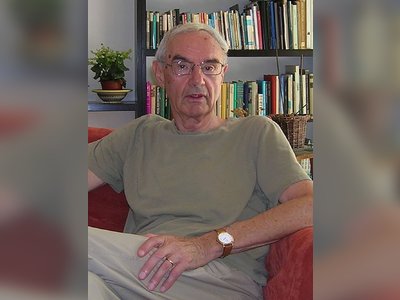מורשת גדולי האומה
בזכותם קיים
beta
Guy Rolnik: A Pioneering Figure in Israeli Media and Economics
Guy Rolnik's career as a journalist, economist, and media entrepreneur has left a significant mark on Israeli media and economic discourse. While his views have evolved over the years, his commitment to scrutinizing economic power and advocating for greater competition and transparency has earned him both acclaim and controversy. Recognized for his outstanding contributions, Rolnik continues to shape the conversation surrounding Israel's economic landscape and media environment.
Guy Rolnik, born on September 2, 1968, is a prominent figure in the world of Israeli media, journalism, and economics. His multifaceted career includes founding TheMarker newspaper, serving as its editor-in-chief until 2013, acting as the publisher of the "Haaretz" group, and holding the position of Clinical Professor at the University of Chicago's Booth School of Business. This comprehensive article delves into his biography, career milestones, economic views, and notable recognitions.
Biography
Guy Rolnik was born in northern Tel Aviv to Amos and Rivka Rolnik. He completed his high school education and later served in the Israeli Defense Forces (IDF) as an economic correspondent after being exempted from military service for medical reasons. Following his discharge from the IDF in 1990, he joined the newspaper "Haaretz" as an economic journalist. After four years, he established the Financial Markets section within the newspaper and became its first editor. In January 1994, he began writing a daily column titled "Market Value," which evolved over the years into an influential economic column.
In 1998, he was appointed as the economic editor of "Haaretz" and became a member of the editorial board, making him the youngest editor to assume such roles at the age of 30. In 2000, Guy Rolnik embarked on a new chapter in his career. He left his position as the economic editor of "Haaretz" and, together with American investors and the "Haaretz" group, founded a groundbreaking venture—the first independent news website in Israel, known as TheMarker. One year after the establishment of TheMarker, the company expanded its operations and launched a monthly magazine by the same name.
In 2005, Rolnik spearheaded the transformation of TheMarker from an online platform into a daily printed economic newspaper, published as a part of "Haaretz." In 2007, he was appointed as the Deputy Publisher of the "Haaretz" group. During this time, Amos Schocken, the publisher of "Haaretz," praised him, stating, "Guy Rolnik led the creation of TheMarker as an entrepreneur, journalist, and, in practice, as a publisher. The diversified activities of TheMarker in recent years have turned it into the central business media platform in Israel, contributing significantly to the group's growth. With TheMarker, Rolnik demonstrated that it was possible to turn the changes in the media world into an opportunity and grow rapidly during a challenging period for the industry. I am confident that we will be able to do the same in all other parts of the "Haaretz" group."
In 2014, Rolnik led a special course at Tel Aviv University's School of Management, titled "Structural Issues in the Israeli Economy." This course was part of the Master of Business Administration (MBA) program with a specialization in Technology, Entrepreneurship, and Innovation.
Guy Rolnik holds a Bachelor's degree in Economics from Tel Aviv University, a Master's degree in Business Administration from the Kellogg-RHKM Program at Tel Aviv University, and an AMP (Advanced Management Program) degree from Harvard Business School.
Rolnik is married to Naama, and they have three children.
Economic Positions and Controversy
Guy Rolnik is well-known as a journalist who focuses on scrutinizing major players in the Israeli private sector, advocating for increased oversight over them. However, in the late 1990s and into the early 2000s, he held a neo-liberal perspective that was evident in both his direct and indirect writings. For instance, he praised the government for consolidating large companies into a smaller group of wealthy owners, citing improved profitability and company performance. In 2005, when the B.D.I. (Business Data Israel) reported the concentration of economic power in Israel, Rolnik praised the 16 conglomerates that dominated the economy. He wrote, "The story of the 'families' controlling the Israeli economy always works. Just say the word 'families,' and the message is already clear: We used to have an open, dispersed, democratic, and free-market economy. However, in recent years, a few families have taken control, choking us in both our throats and wallets. Add the slogans 'wealth' and 'power' (and if you want, 'newspaper'), and everything becomes clear: our situation is deteriorating." Rolnik concluded that "private hands are better than government hands; they are generally more efficient, stronger, and wealthier."
In subsequent years, Rolnik shifted his focus to criticize the operations of these private conglomerates, advocating for increased competition among them and condemning media outlets that failed to do so. He argued that "not enough is written about the power of the rich."
His economic positions became particularly prominent during the 2011 social protest movement in Israel. Rolnik vehemently opposed the public criticism focused solely on the government of Benjamin Netanyahu, believing the protest provided an opportunity to address the power of major corporations. He asserted that the protest "received encouragement from the media in its first weeks, as long as it focused on the government."
While his economic views garnered significant public support, they also faced criticism over the years. Professor Danny Gutwein, a vocal opponent of privatization policies, accused Rolnik of perpetuating the myth of the "Connected" - the belief that competition is the magical solution to all of Israel's economic and social problems. Gutwein argued that Rolnik packaged the concept of the "Connected" as an economic panacea and, through repeated usage, turned it into a discursive mechanism reminiscent of the biblical struggle between the Sons of Light and the Sons of Darkness. Yoni Levi, one of the initiators of the social protest movement, expressed his opposition to Rolnik's "outdated and defeatist political perception."
In 2015, Rolnik reinforced his economic positions through the first episode of the documentary series "The Money Dish," which examined the economic and societal conditions in Israel. In this episode, titled "The Mission of Guy Rolnik," he discussed economic concentration, the connections between wealth and power, political corruption, social capital, and the lack of regulation within the Israeli defense budget. This episode received widespread acclaim and generated significant public interest.
Awards
Guy Rolnik has received several awards in recognition of his contributions to journalism and economics. In 2005, he was awarded the Knight of Quality Government medal for his unique contribution to the field of communication, exposing flaws and faults in public service, combating corruption, and improving the quality of public management. In 2007, he received the Quality Economic Journalism award from the Honorary Presidency of the "Association for the Public's Right to Know." The award citation stated, "The journalist Guy Rolnik is one of the best economic journalists and commentators in Israel today. With his clear and incisive writing, Mr. Rolnik demonstrates exceptional civic courage, not hesitating to scrutinize powerful figures in Israel's economy, thereby highlighting the importance of such criticism in improving governance. He serves as a role model and an example of quality journalism to his colleagues in the media and to Israeli society."
In 2013, Guy Rolnik was honored with the Sokolov Prize for his lifetime achievement, specifically for "transforming economic journalism into a significant player in the economic and social discourse."
Copyright Infringement
In 2012, the Tel Aviv District Court ruled that Guy Rolnik was personally responsible for a series of copyright infringements and reproductions of journalistic content on TheMarker website without obtaining permission from the creators and without proper attribution. For these violations, Rolnik, along with TheMarker website and its editor, Itan Avriel, were ordered to pay compensation of 6 million Israeli Shekels to the "Maariv" newspaper. Both parties appealed the decision to the Supreme Court, and in a settlement agreement reached between them, TheMarker agreed to pay "Maariv" compensation in the amount of 3.3 million Israeli Shekels, and Rolnik and Avriel's personal liability was revoked.
Biography
Guy Rolnik was born in northern Tel Aviv to Amos and Rivka Rolnik. He completed his high school education and later served in the Israeli Defense Forces (IDF) as an economic correspondent after being exempted from military service for medical reasons. Following his discharge from the IDF in 1990, he joined the newspaper "Haaretz" as an economic journalist. After four years, he established the Financial Markets section within the newspaper and became its first editor. In January 1994, he began writing a daily column titled "Market Value," which evolved over the years into an influential economic column.
In 1998, he was appointed as the economic editor of "Haaretz" and became a member of the editorial board, making him the youngest editor to assume such roles at the age of 30. In 2000, Guy Rolnik embarked on a new chapter in his career. He left his position as the economic editor of "Haaretz" and, together with American investors and the "Haaretz" group, founded a groundbreaking venture—the first independent news website in Israel, known as TheMarker. One year after the establishment of TheMarker, the company expanded its operations and launched a monthly magazine by the same name.
In 2005, Rolnik spearheaded the transformation of TheMarker from an online platform into a daily printed economic newspaper, published as a part of "Haaretz." In 2007, he was appointed as the Deputy Publisher of the "Haaretz" group. During this time, Amos Schocken, the publisher of "Haaretz," praised him, stating, "Guy Rolnik led the creation of TheMarker as an entrepreneur, journalist, and, in practice, as a publisher. The diversified activities of TheMarker in recent years have turned it into the central business media platform in Israel, contributing significantly to the group's growth. With TheMarker, Rolnik demonstrated that it was possible to turn the changes in the media world into an opportunity and grow rapidly during a challenging period for the industry. I am confident that we will be able to do the same in all other parts of the "Haaretz" group."
In 2014, Rolnik led a special course at Tel Aviv University's School of Management, titled "Structural Issues in the Israeli Economy." This course was part of the Master of Business Administration (MBA) program with a specialization in Technology, Entrepreneurship, and Innovation.
Guy Rolnik holds a Bachelor's degree in Economics from Tel Aviv University, a Master's degree in Business Administration from the Kellogg-RHKM Program at Tel Aviv University, and an AMP (Advanced Management Program) degree from Harvard Business School.
Rolnik is married to Naama, and they have three children.
Economic Positions and Controversy
Guy Rolnik is well-known as a journalist who focuses on scrutinizing major players in the Israeli private sector, advocating for increased oversight over them. However, in the late 1990s and into the early 2000s, he held a neo-liberal perspective that was evident in both his direct and indirect writings. For instance, he praised the government for consolidating large companies into a smaller group of wealthy owners, citing improved profitability and company performance. In 2005, when the B.D.I. (Business Data Israel) reported the concentration of economic power in Israel, Rolnik praised the 16 conglomerates that dominated the economy. He wrote, "The story of the 'families' controlling the Israeli economy always works. Just say the word 'families,' and the message is already clear: We used to have an open, dispersed, democratic, and free-market economy. However, in recent years, a few families have taken control, choking us in both our throats and wallets. Add the slogans 'wealth' and 'power' (and if you want, 'newspaper'), and everything becomes clear: our situation is deteriorating." Rolnik concluded that "private hands are better than government hands; they are generally more efficient, stronger, and wealthier."
In subsequent years, Rolnik shifted his focus to criticize the operations of these private conglomerates, advocating for increased competition among them and condemning media outlets that failed to do so. He argued that "not enough is written about the power of the rich."
His economic positions became particularly prominent during the 2011 social protest movement in Israel. Rolnik vehemently opposed the public criticism focused solely on the government of Benjamin Netanyahu, believing the protest provided an opportunity to address the power of major corporations. He asserted that the protest "received encouragement from the media in its first weeks, as long as it focused on the government."
While his economic views garnered significant public support, they also faced criticism over the years. Professor Danny Gutwein, a vocal opponent of privatization policies, accused Rolnik of perpetuating the myth of the "Connected" - the belief that competition is the magical solution to all of Israel's economic and social problems. Gutwein argued that Rolnik packaged the concept of the "Connected" as an economic panacea and, through repeated usage, turned it into a discursive mechanism reminiscent of the biblical struggle between the Sons of Light and the Sons of Darkness. Yoni Levi, one of the initiators of the social protest movement, expressed his opposition to Rolnik's "outdated and defeatist political perception."
In 2015, Rolnik reinforced his economic positions through the first episode of the documentary series "The Money Dish," which examined the economic and societal conditions in Israel. In this episode, titled "The Mission of Guy Rolnik," he discussed economic concentration, the connections between wealth and power, political corruption, social capital, and the lack of regulation within the Israeli defense budget. This episode received widespread acclaim and generated significant public interest.
Awards
Guy Rolnik has received several awards in recognition of his contributions to journalism and economics. In 2005, he was awarded the Knight of Quality Government medal for his unique contribution to the field of communication, exposing flaws and faults in public service, combating corruption, and improving the quality of public management. In 2007, he received the Quality Economic Journalism award from the Honorary Presidency of the "Association for the Public's Right to Know." The award citation stated, "The journalist Guy Rolnik is one of the best economic journalists and commentators in Israel today. With his clear and incisive writing, Mr. Rolnik demonstrates exceptional civic courage, not hesitating to scrutinize powerful figures in Israel's economy, thereby highlighting the importance of such criticism in improving governance. He serves as a role model and an example of quality journalism to his colleagues in the media and to Israeli society."
In 2013, Guy Rolnik was honored with the Sokolov Prize for his lifetime achievement, specifically for "transforming economic journalism into a significant player in the economic and social discourse."
Copyright Infringement
In 2012, the Tel Aviv District Court ruled that Guy Rolnik was personally responsible for a series of copyright infringements and reproductions of journalistic content on TheMarker website without obtaining permission from the creators and without proper attribution. For these violations, Rolnik, along with TheMarker website and its editor, Itan Avriel, were ordered to pay compensation of 6 million Israeli Shekels to the "Maariv" newspaper. Both parties appealed the decision to the Supreme Court, and in a settlement agreement reached between them, TheMarker agreed to pay "Maariv" compensation in the amount of 3.3 million Israeli Shekels, and Rolnik and Avriel's personal liability was revoked.
- גיא רולניק – ויקיפדיהhe.wikipedia.org







